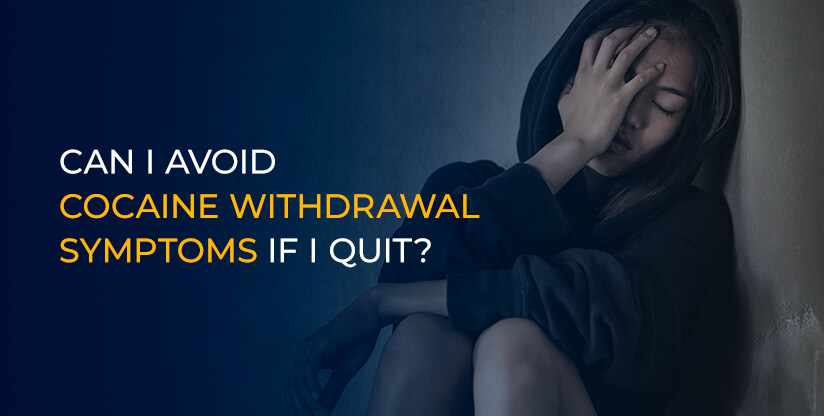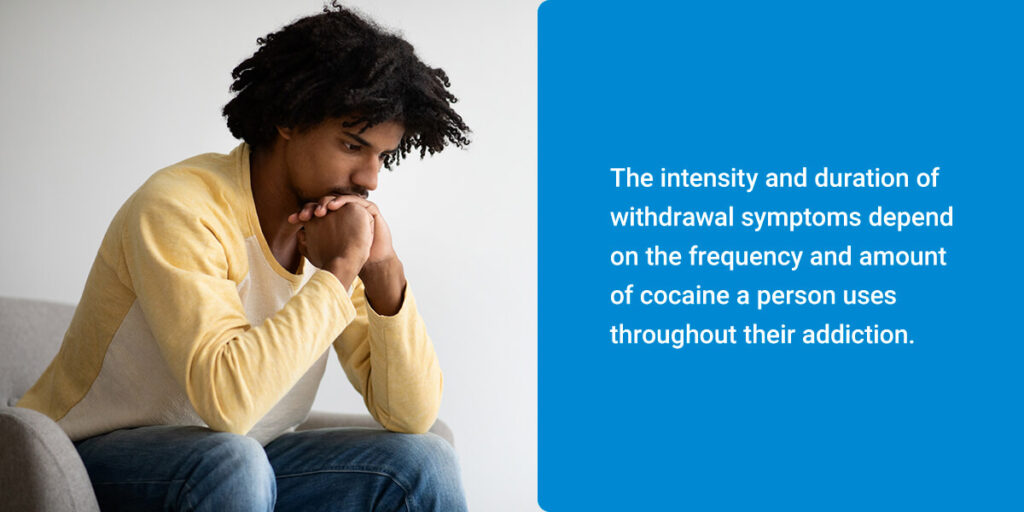- Mar 21
- Addiction TherapyDrug Addiction TreatmentRecovery

Cocaine is a powerful stimulant, and as you’re likely aware, quitting cocaine is probably one of the most challenging things you will ever do. You’re not alone. Approximately 1.5 million people use cocaine in the United States at least once a month. You don’t have to be one of them.
Right now, you might be trying to talk yourself out of quitting cocaine. Maybe you’re worried about your friendships that revolve around the drug or how you’ll cope without that energetic high. Perhaps you’re trying to convince yourself that there’s no point because you won’t be able to stay sober long-term anyway. The biggest worry for many starting the path to recovery is the symptoms of cocaine withdrawal, the effects you’ll experience as the drug leaves your body.
We won’t lie to you here. Cocaine withdrawal is often incredibly uncomfortable, but it’s a necessary step on your path toward recovery. What are the withdrawal effects of cocaine, how can you manage them, and why is this uncomfortable step so essential for your recovery?
Common Cocaine Withdrawal Symptoms
While the severity of your symptoms will depend on the length of time you’ve been using the drug, common cocaine withdrawal signs include:
- Exhaustion and fatigue
- Restlessness
- Low or no motivation
- Lack of concentration
- A lack of joy and pleasure
- Nightmares
- Reduced sex drive
- Cravings for cocaine
- Depression
- Suspicion and paranoia
- Suicidal thoughts
What Causes Cocaine Withdrawal?
Cocaine works by increasing the amount of dopamine the brain produces. In a healthy brain, dopamine is released and then recycled back into the cell that it came from, cutting off the signal and stopping your brain’s reward circuit from becoming overloaded. Cocaine works by preventing the dopamine-recycling process. Your brain’s reward center gets short-circuited and eventually adapts to the excess dopamine in your system. That’s why long-time users must take higher and more frequent doses to get the same high.
When you use cocaine for any length of time, your body becomes dependent on the chemical’s presence. It forgets how to regulate its hormones, so when you stop taking the drug, your brain gets a crash course on dopamine regulation and must re-learn how these systems work. It’s not uncommon for cocaine depression to set in, making it difficult for users to stay clean.
How Long Does Withdrawal Last?

Withdrawal can last for different periods depending on the person and the severity of their addiction. Many start experiencing symptoms just a few hours after stopping using the substance. A person will start to feel cravings for the drug and detox symptoms, which typically peak sometime during the first month but gradually get better. Some people may only experience withdrawal symptoms for a week or two, while others may experience symptoms for weeks or more, a condition known as post-acute withdrawal syndrome. After a few weeks, the withdrawal symptoms lessen as the body heals, though some may still experience cravings and general anxiety throughout recovery.
The intensity and duration of withdrawal symptoms depend on the frequency and amount of cocaine a person uses throughout their addiction. People who took smaller doses of cocaine at less frequent intervals may only experience withdrawal symptoms for the first week of detox. Others who used stronger or higher doses throughout the entirety of their addiction may have more intense withdrawals that last longer. Other factors that can influence the intensity of cocaine withdrawal include the individual’s health, how they used cocaine, their mental condition and the drug’s purity.
Since some withdrawal symptoms can be uncomfortable and may last for some time, cocaine can be difficult to quit. While there are many symptoms of withdrawal, some may cause more discomfort than others, such as:
- Fatigue or lethargy
- Anxiety and irritability
- Muscle aches or physical tremors
- Nausea or vomiting
- Excessive sweating
- Paranoia and suicidal ideation
Some people would rather avoid these symptoms than go through the detox process, which can make their addiction worse. Ideally, a person should stop using cocaine as soon as possible to lessen their addiction and reduce the severity of their withdrawal symptoms. A professional can help you find tools to help you manage discomfort and offer support during and after detox.
Dangers of Cocaine Withdrawal
Compared to other drugs or alcohol, withdrawals from cocaine aren’t as dangerous. Some substances can have potentially deadly symptoms during the detox process, such as seizures or extreme dehydration. While cocaine withdrawal symptoms aren’t typically life-threatening, they can still be considerably uncomfortable and make a person less likely to seek necessary treatment.
Physical health problems can occur when combining cocaine with other substances, such as alcohol. Withdrawals from cocaine and other substances simultaneously can increase the risk of health problems, such as heart attacks. Others may be prone to seizures when going through withdrawals from cocaine and other substances like benzodiazepines. It’s essential to be honest with your addiction treatment specialists about your substance use history to get the best treatment possible.
The most dangerous cocaine withdrawal symptoms are severe depression and suicidal ideation. A person may develop symptoms such as low motivation, energy or mood. These symptoms are why people need monitoring and support for cocaine withdrawal. Many people who use cocaine also struggle with depression, which could be why an addiction formed in the first place as a method to self-medicate. Withdrawal can temporarily worsen these symptoms, so someone going through withdrawal must have the necessary support and monitoring from a professional team.
Other dangerous cocaine withdrawal symptoms include paranoia, violence or aggression, which can be dangerous for the person experiencing the withdrawal and those looking after them.
Identifying Withdrawal Symptoms in a Loved One
It can be challenging to watch a loved one go through addiction or withdrawal, and it can be difficult to determine if someone you love is struggling with withdrawal. The good news is that there are signs of withdrawal to look for so you can more effectively support your loved one during their recovery. Some additional signs to look for include challenges with sleep, such as temporary insomnia, nightmares or disruption and poor cognition, such as difficulties concentrating, trouble making decisions or generally slowed thinking.
If you notice any of these withdrawal signs in a loved one, you should encourage them to get professional help to aid in their recovery. Try to help them be as comfortable as possible and find healthy ways to distract them from their symptoms. Remember to be patient with your loved one and know that the detox process is temporary. Supporting your loved one through this challenging time can help reduce the risk of relapse and ensure they can make a full recovery.
How to Manage Cocaine Withdrawal Symptoms
When it comes to dealing with cocaine withdrawal symptoms, seeking out the help of a professional rehab is your best course of action. They will have the tools to help decrease your discomfort, and their personnel can lend a supportive hand to help you through this process.
Additionally, professional rehab programs have doctors on hand to watch for rare or dangerous cocaine detox symptoms that might threaten your health. They also ensure that you’re eating a healthy diet and drinking enough water to flush the toxins out of your body.
Medical withdrawal programs help you escape the harmful influences in your life that might make a recovery more challenging. This process enables you to make it through your withdrawal period without temptations that might derail your plans.
Withdrawal Management Services at Gateway
If you’re addicted to cocaine, then you’re not alone. Presently, the NIDA states that 1.5 million Americans use cocaine at least once per month. Help is available to quit cocaine for good at Gateway. Notably, our cocaine withdrawal treatment centers in Illinois have been open for 50 years. We have friendly, knowledgeable clinicians ready to plan your Addiction Treatment. Immediately, we’ll get you started in a customized, holistic care program. Most insurance policies cover our accredited services, such as:
Don’t risk quitting cocaine cold turkey. In short, you could desperately respond to cravings with too much cocaine and overdose. Instead, check out cocaine withdrawal treatment at Gateway. Call us at 855.972.6105 with your questions about cocaine withdrawal symptoms now. We can help.



